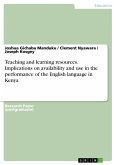Migrant remittances have been noted for their development impact in developing countries more especially among remittance receiving households. Yet, the dynamics of remittance utilisation that determine their effectiveness has somehow been ignored at the household level. Remittance utilisation has become a social activity, not merely an economic activity. This book, through empirical findings submits that remittances evolve into a social process, shaping household social relations and are in turn shaped by existing family bonds, filial care and kinship ties. These ties could be enhanced or diminished by the very ways remittances are used. Therefore, this book provides a new context through which remittances, which have been widely seen for their development impacts, are evaluated.
Bitte wählen Sie Ihr Anliegen aus.
Rechnungen
Retourenschein anfordern
Bestellstatus
Storno








